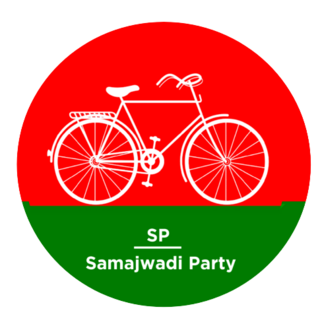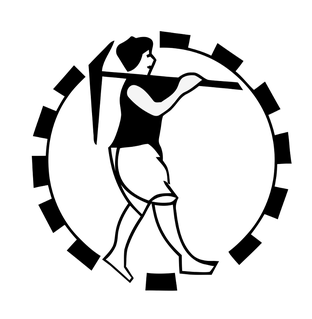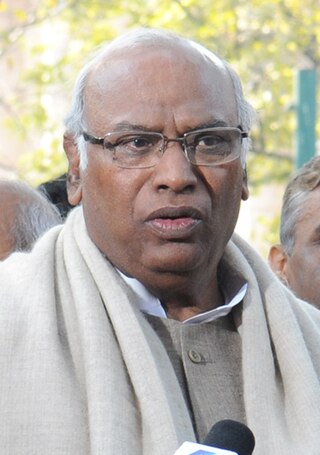P. Viswanathan is an Indian politician and incumbent member of the Parliament of India from Kancheepuram Constituency. [1] He represents the Indian National Congress party.
P. Viswanathan is an Indian politician and incumbent member of the Parliament of India from Kancheepuram Constituency. [1] He represents the Indian National Congress party.
Politics of India works within the framework of the country's Constitution. India is a parliamentary secular democratic republic in which the president of India is the head of state & first citizen of India and the Prime Minister of India is the head of government. It is based on the federal structure of government, although the word is not used in the Constitution itself. India follows the dual polity system, i.e. federal in nature, that consists of the central authority at the centre and states at the periphery. The Constitution defines the organizational powers and limitations of both central and state governments; it is well recognised, fluid and considered supreme, i.e. the laws of the nation must conform to it. India is officially declared a secular and socialist state as per the Constitution.

The president of India is the head of state of the Republic of India. The president is the nominal head of the executive, the first citizen of the country, as well as the supreme commander of the Indian Armed Forces. Droupadi Murmu is the 15th and current president, having taken office from 25 July 2022.

The Bharatiya Janata Party is a political party in India and one of the two major Indian political parties alongside the Indian National Congress. Since 2014, it has been the ruling political party in India under the incumbent Prime Minister Narendra Modi. The BJP is aligned with right-wing politics and has close ideological and organisational links to the Rashtriya Swayamsevak Sangh (RSS), a far-right paramilitary organisation. Its policies adhere to Hindutva, a Hindu nationalist ideology. As of January 2024, it is the country's biggest political party in terms of representation in the Parliament of India as well as state legislatures.

The Indian National Congress (INC), colloquially the Congress Party or simply the Congress, is a political party in India with deep roots in most regions of India. Founded on 28 December 1885, it was the first modern nationalist movement to emerge in the British Empire in Asia and Africa. From the late 19th century, and especially after 1920, under the leadership of Mahatma Gandhi, the Congress became the principal leader of the Indian independence movement. The Congress led India to independence from the United Kingdom, and significantly influenced other anti-colonial nationalist movements in the British Empire.

Sonia Gandhi is an Indian politician. She is the longest-serving president of the Indian National Congress, a social democratic political party, which has governed India for most of its post-independence history. She took over as the party leader in 1998, seven years after the assassination of Rajiv Gandhi, her husband and a former Prime Minister of India, and remained in office until 2017 after serving for twenty-two years. She returned to the post in 2019 and remained the President for another three years.

The Communist Party of India (Marxist) (abbreviated as CPI(M)) is a communist political party in India. It is the largest communist party in India in terms of membership and electoral seats, and one of the national parties of India. The party was founded through a splitting from the Communist Party of India in 1964 and it quickly became the dominant faction.

The Samajwadi Party is a socialist political party in India. It was founded on 4 October 1992 by former Janata Dal politician Mulayam Singh Yadav and is headquartered in New Delhi. The Samajwadi Party is currently led by former Chief Minister of Uttar Pradesh, Akhilesh Yadav. As of 2024, it is currently the third-largest political party in India, and the largest party in Uttar Pradesh.

The Telugu Desam Party is an Indian regional political party with influence in the states of Andhra Pradesh and Telangana. It was founded by Telugu movie star N. T. Rama Rao (NTR) on 29 March 1982 and has focused on supporting Telugu people. The party has won a five-time majority in the Andhra Pradesh Legislative Assembly and has emerged as the most successful political outfit in the state's history. It is currently the ruling party in the Andhra Pradesh Legislative Assembly.

Narendra Damodardas Modi is an Indian politician serving as the current prime minister of India since 26 May 2014. Modi was the chief minister of Gujarat from 2001 to 2014 and is the Member of Parliament (MP) for Varanasi. He is a member of the Bharatiya Janata Party (BJP) and of the Rashtriya Swayamsevak Sangh (RSS), a right-wing Hindu nationalist paramilitary volunteer organisation. He is the longest-serving prime minister outside the Indian National Congress.

The Janata Party is an unrecognized political party in India. It was founded as an amalgam of Indian political parties opposed to the Emergency that was imposed between 1975 and 1977 by Prime Minister Indira Gandhi of the Indian National Congress. In the 1977 general election, the party defeated the Congress and Janata leader Morarji Desai became the first non-Congress prime minister in independent modern India's history.
Indian National Lok Dal (INLD) is a political party based primarily in the Indian state of Haryana. It was initially founded as the Haryana Lok Dal (Rashtriya) by Devi Lal in 1996, who served as the Deputy Prime Minister of India.
India has a parliamentary system as defined by its constitution, with power distributed between the union government and the states. India's democracy is the largest democracy in the world.

Mapanna Mallikarjun Kharge is an Indian lawyer and politician serving as the President of the Indian National Congress since 2022, and Leader of the Opposition in Rajya Sabha since 2021. He has been a Member of Parliament, Rajya Sabha from Karnataka since 2020.

General elections were held in India in seven phases from 11 April to 19 May 2019 to elect the members of the 17th Lok Sabha. Votes were counted and the result was declared on 23 May. Around 912 million people were eligible to vote, and voter turnout was over 67 per cent – the highest ever, as well as the highest ever participation by women voters until 2024 Indian general election.

The Election Commission of India (ECI) is a constitutional body established by the Constitution of India empowered to conduct free and fair elections in India. The Election commission is headed by a Chief Election Commissioner and consists of two other Election Commissioners.

A Member of Parliament in the Lok Sabha is the representative of a legislative constituency in the Lok Sabha; the lower house of the Parliament of India. Members of parliament of Lok Sabha are chosen by direct elections on the basis of the adult suffrage. The maximum permitted strength of members of parliament in the Lok Sabha is 550. This includes the maximum 530 members to represent the constituencies and states and up to 20 members to represent the union territories. Between 1952 and January 25, 2020, two seats were reserved for members of the Anglo-Indian community. The current elected strength of the Lok Sabha is 543. The party—or coalition of parties—having a majority in the Lok Sabha chooses the Prime Minister of India.